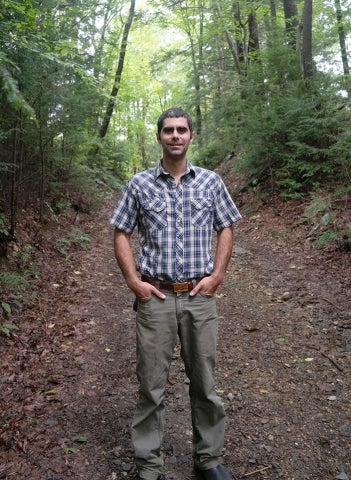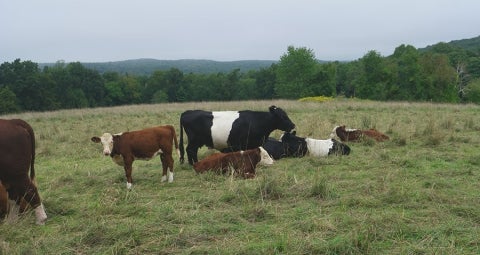Eleven cows made the trip from upstate New York to tiny Union, Conn., this summer, where they are now happily grazing on a 133-acre plot of land that overlooks part of the Yale-Myers Forest. Soon enough, a house will be built there, says Joe Orefice ’09 M.F., complete with a diversified farm — including silvopasture, the integration of trees, forage plants, and livestock.
Orefice bought the land after being named the Director of Forest & Agricultural Operations at the Yale School of Forestry & Environmental Studies (F&ES). The new position puts Orefice in charge of Yale’s forest operations while also teaching courses in agroforestry and forest management at F&ES.
Orefice returns to New Haven after a stint as director of Cornell University’s Uihlein Sugar Maple Research Forest, a 6,000-tap commercial maple and birch syrup operation in upstate New York. Before that, Orefice spent nearly a decade on the faculty at Paul Smith’s College while earning his Ph.D. from the University of New Hampshire, where he focused on temperate silvopasture systems.
We recently talked to Orefice about coming back to Yale and how he plans to integrate agriculture into the broader F&ES curriculum.
It sounds like it was a tough decision to leave New York. What made you do it?
It was hard — I was really comfortable there. I had a farm I had just got up and running, and a great endowed position at Cornell. But it was ultimately the F&ES community that brought me back. It’s such an engaging atmosphere that had a big impact on me as a student, opening me up to new ideas and providing opportunities to grow in my career. Also, the opportunity to work with faculty members who I hold in high regard, like Mark Ashton. They were important mentors to me, and I look forward to mentoring students and playing a role as they develop and go out into their careers.
This is a new position. How will it work?
I’ll be working closely with Marlyse Duguid [the Thomas G. Siccama Lecturer],
who serves as the research coordinator for the F&ES forests. While she oversees research and teaches, I will direct all of the different forest operations, like timber harvesting, the Quiet Corner Initiative, and the day-to-day management of the forests and facilities. I will also be teaching courses on temperate agroforestry and forest management, so teaching practical forestry courses to equip students with critical thinking skills.
Much of your experience includes agriculture. How will that fit into your work?
People have often asked, “What does Yale have for agriculture?” While new, agricultural opportunities at Yale are gaining momentum. Agroforestry is one way we can do it — maple is probably the best example in the Northeast — but for the School Forests to become a producer, we need to make sure that they’re productive and financially viable. I think there is significant potential to offer agricultural education by utilizing the resources of the Yale Forests and connecting students with global partnerships in agriculture — especially agroforestry.
There’s also silvopasture, where my research interests lie. It requires somebody practicing sustainable pasture management, with the added benefit that trees in the pasture are providing a product, as well, like fruit or nuts. I don’t see us bringing livestock into Yale Forests, but I do plan to use my personal farm in Union as an example of a thriving silvopasture for teaching and research purposes.
What is the future of the M.F. program?
One of my goals of the M.F. program is to build on a three-tiered system that F&ES has started to implement over the last decade. In this system, students learn the critical skills of being a forester through coursework and field trips. The second tier is practical experience through summer internships on our forest crew and as assistant forest managers. The third tier of this is for students to have opportunities for immediate post-graduate positions leading the management of a variety of forests.
We are currently working on ways to expand these apprenticeship opportunities to western and southern U.S. forests. I have always bought into the importance of providing students with a world-class curriculum that dovetails with practical experience. My teaching philosophy has been that the best education occurs when students are able to apply what they’ve learned. I am excited to work with my colleagues at F&ES as we take our forestry program to the next level.
 Joe Orefice at Yale-Myers Forest
Joe Orefice at Yale-Myers Forest
 Cows graze on Joe Orefice’s 133-acre property in Union, Conn.
Cows graze on Joe Orefice’s 133-acre property in Union, Conn.